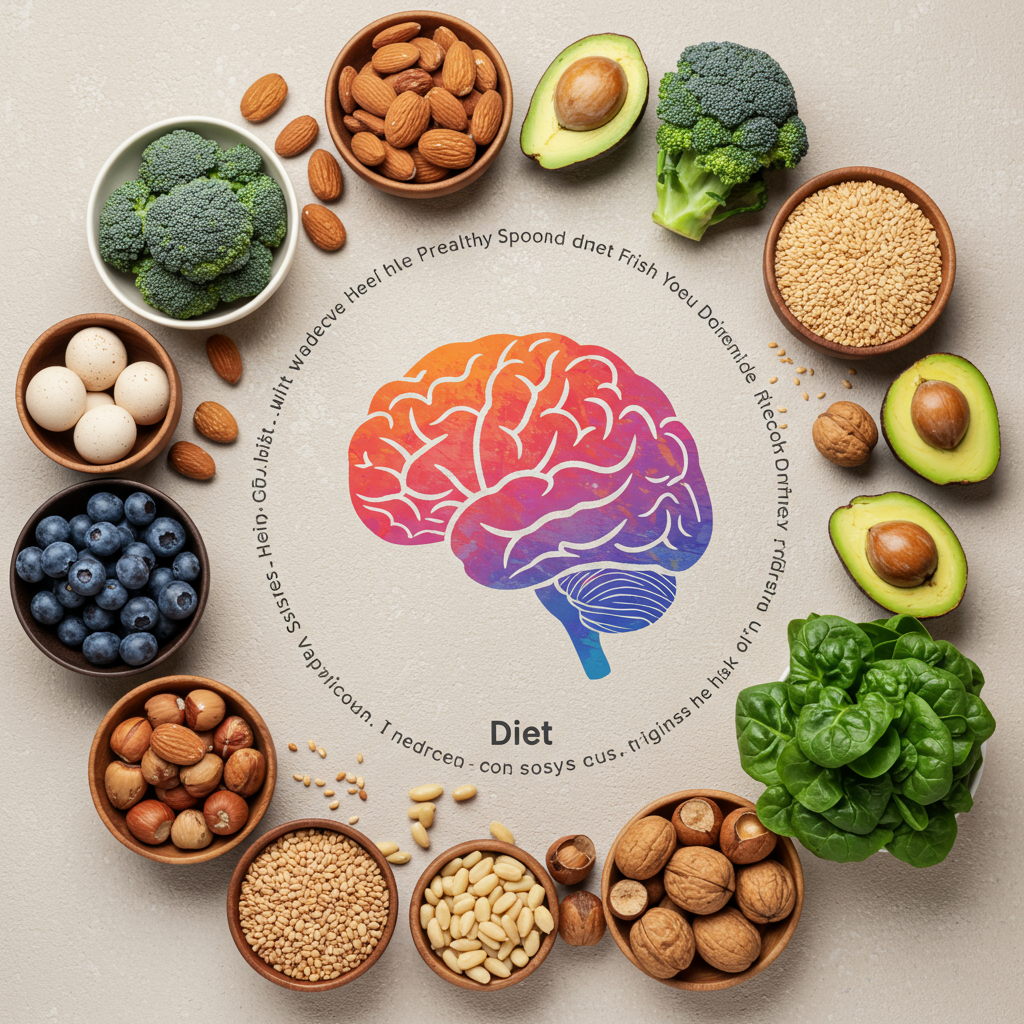Dementia is a complex syndrome characterized by a decline in brain function. This condition impacts cognitive abilities like memory, thinking, and problem-solving, affecting nearly one million people across the UK alone. While often associated with aging, particularly those over 65, age is not the sole determinant of risk.
The prospect of cognitive decline is concerning for many. However, understanding and modifying certain aspects of your lifestyle can significantly influence your susceptibility. Research suggests that as much as 45 percent of dementia cases could potentially be prevented through actionable lifestyle changes. Among these, dietary choices stand out as a powerful area where proactive steps can meaningfully lower your risk.
The Link Between Diet and Dementia Risk
Your brain health is intricately connected to what you eat. Just as certain nutrients fuel optimal body function, specific dietary patterns can support cognitive vitality and resilience against age-related decline.
Dementia’s Growing Impact
Affecting a significant portion of the population, dementia presents a major public health challenge. While most prevalent in older adults, its roots can span decades, making early awareness and preventative measures crucial regardless of your current age. Recognizing that lifestyle plays a key role empowers individuals to take control of their brain health journey.
Why Lifestyle Matters
Dietary habits are just one part of a broader lifestyle picture that influences brain health. Research consistently shows that factors like physical activity, social engagement, and managing chronic conditions like high blood pressure are all interlinked with cognitive function. Focusing on these modifiable elements offers a powerful pathway to reducing dementia risk and promoting overall well-being.
Unpacking the ‘Single Most Important’ Dietary Factor
Experts have long explored specific foods and eating patterns for their potential protective effects on the brain. Recent research points towards one established dietary approach and a key component within it as having a particularly notable impact on lowering the risk of cognitive impairment.
The Mediterranean Diet Connection
A landmark 2020 study published in the Alzheimer’s and Dementia journal investigated dietary factors linked to cognitive health. This extensive research, tracking over 7,750 individuals for close to a decade, identified the Mediterranean diet as potentially the “single most important dietary factor in lowering the risk of cognitive impairment.”
The Mediterranean diet is not a strict regimen but a way of eating based on the traditional foods of countries bordering the Mediterranean Sea. It emphasizes whole, unprocessed foods including plenty of fresh vegetables, fruits, legumes, nuts, beans, and whole grains. Healthy fats, primarily olive oil, are central, along with regular consumption of fish and poultry, while limiting red meat and avoiding processed items. This eating pattern is celebrated not only for its brain-boosting potential but also for its association with reduced risk of heart disease, metabolic syndrome, type 2 diabetes, certain cancers, and even depression.
Fish: A Core Component
Adherence to the Mediterranean diet in the study was strongly associated with a reduced chance of cognitive deterioration. Researchers largely attributed this benefit to the diet’s emphasis on fish consumption. Fish emerged in the analysis as particularly significant, being linked to “higher cognitive function.”
Experts have echoed this finding, with some, like those cited by Harvard Health and within the study’s context, hailing fish as the unequivocal “single most important dietary factor” specifically for reducing the risk of cognitive impairment within the framework of this study’s analysis. The research indicated that regular fish consumption was the sole food item directly associated with a decreased likelihood of cognitive decline among all foods studied within that dietary pattern.
Omega-3s and Brain Structure
The protective effects of fish are largely attributed to its rich content of omega-3 fatty acids. These essential fats are vital structural components found abundantly in the membranes of brain tissue. Consuming adequate amounts of omega-3s, particularly EPA and DHA found in fatty fish, is crucial for maintaining brain cell structure and function throughout life. This nutritional foundation is believed to support cognitive performance and potentially offer resilience against neurodegenerative processes.
Beyond Just One Food: Other Key Dietary Considerations
While fish and the Mediterranean diet pattern receive significant attention for cognitive health, a truly brain-healthy diet is diverse and includes a range of nutrient-rich foods that work synergistically. Other foods offer valuable contributions through healthy fats, antioxidants, and fiber.
The Role of Healthy Fats, Protein, and Fiber
Beyond the omega-3s in fish, other nutrient-dense foods provide essential building blocks and protective compounds for the brain. Take, for example, peanut butter – a common and inexpensive food highlighted by experts like Dr. Dan Gubler, a scientist specializing in natural compounds, and registered dietitians. They point to its significant health benefits, including potential links to reduced risk of chronic illnesses like heart disease, type 2 diabetes, and certain cancers.
Peanut butter is a good source of heart-healthy monounsaturated and polyunsaturated fats. These fats, unlike saturated or trans fats, can help lower harmful LDL cholesterol and triglyceride levels, supporting cardiovascular health – which is closely tied to brain health. The protein and fiber content in peanut butter also contribute to feeling fuller for longer and help stabilize blood sugar levels, particularly when consumed with carbohydrates. Stable blood sugar is beneficial for overall metabolic health, which impacts the brain. Including a couple of tablespoons a day can add valuable nutrients to your diet; checking the ingredients for minimal additives like added sugars is recommended, though expensive brands aren’t necessary for benefits.
Antioxidants: Protecting Brain Cells
Many plant-based foods are rich in antioxidants. These powerful compounds help protect your brain cells from damage caused by unstable molecules called free radicals. While free radicals are natural byproducts of metabolism, an imbalance can lead to “oxidative stress,” which is implicated in cellular impairment, aging, and increased risk of various chronic diseases, including cognitive decline and dementia.
Foods like fruits, vegetables (which the 2020 study noted had the second-highest impact after fish on cognitive decline), nuts, seeds, and even cocoa contain various antioxidants such as vitamin E, Vitamin C, carotenoids, flavonoids, and phenolic compounds. Incorporating a colorful variety of these foods into your daily diet provides a spectrum of antioxidants working to safeguard your brain health.
Foods to Limit or Avoid
Just as certain foods support brain function, others can potentially undermine it. Experts like the British Heart Foundation (BHF) advise limiting or avoiding foods known to negatively impact cardiovascular and metabolic health, which in turn affects the brain.
These include foods high in saturated and trans fats, excessive sodium, and added sugars, such as fried and fast foods, red meats (especially processed varieties), pastries, and butter. Regularly consuming these can contribute to inflammation, weight gain, high cholesterol, and high blood pressure – all risk factors for cognitive decline and dementia. Making conscious choices to reduce intake of these items is a practical step in a brain-healthy dietary strategy.
More Than What You Eat: Lifestyle Factors for Brain Health
While diet is a cornerstone, a holistic approach to reducing dementia risk involves several other key lifestyle areas. What’s good for your heart is often good for your brain, and optimizing cardiovascular health is paramount.
The Critical Link: Blood Pressure and Cognitive Health
High blood pressure is a major modifiable risk factor for both heart disease and stroke, but critically, it also significantly impacts brain health and increases the risk of dementia. Cerebrovascular disease, which affects the blood vessels supplying the brain, contributes significantly to cognitive impairment. High blood pressure, particularly in mid-adulthood (ages 30s and 40s), puts strain on these delicate vessels over time, making them more vulnerable.
A landmark four-year clinical trial involving nearly 34,000 patients with untreated high blood pressure showed compelling results. Effectively controlling blood pressure, targeting levels around 130/80mmHg through medication and lifestyle coaching, slashed the risk of dementia by 15% and cognitive impairment by 16% in the study participants. Experts hailed this as a “wake-up call” and a “major advance” in dementia prevention, emphasizing the need for intensive blood pressure management not just for heart health, but explicitly for preserving cognitive function. Monitoring and controlling your blood pressure is therefore an essential preventive measure.
Exercise: Non-Negotiable for Brain Vitality
Physical activity is widely regarded as one of the single best things you can do for your brain. As neurologist Professor Jonathan Schott of Alzheimer’s Research UK emphasizes, staying active helps manage risk factors like high blood pressure and cholesterol, contributes to healthy weight, and boosts overall mental well-being.
Aim for some daily exercise. Current guidelines often recommend at least 20 minutes of activity that significantly raises your heart rate three to four times a week. But even simpler steps, like taking the stairs, walking regularly, or integrating more movement throughout your day, contribute positively. Emerging evidence even suggests exercise may release chemicals from muscles that directly benefit the brain, potentially mitigating some effects of dementia-causing diseases.
Keeping Your Brain Active and Connected
Engaging your mind and staying socially active are also crucial for brain resilience. Learning new skills, whether it’s a language, an instrument, playing chess, or even a craft like crochet, helps strengthen neural connections and build cognitive reserve. The key is to find stimulating activities you genuinely enjoy to ensure sustained engagement.
Social interaction is equally vital. Maintaining strong social ties has been linked to a reduced risk of dementia. Spending time with friends and loved ones provides cognitive stimulation through conversation and helps individuals stay connected to their environment. Engaging in enjoyable activities with others offers both mental stimulation and the protective benefits of social connection.
Taking Action: Practical Steps for Reducing Risk
Reducing your risk of dementia is an achievable goal that involves adopting a multifaceted approach focused on diet and lifestyle. Small, consistent changes can have a significant impact over time.
Build a Brain-Healthy Plate
Prioritize a dietary pattern rich in whole, unprocessed foods, similar to the Mediterranean style. Focus on increasing your intake of:
Fish: Especially fatty fish like salmon, mackerel, and sardines, for their omega-3 content.
Fruits and Vegetables: Aim for a wide variety of colors to maximize antioxidant intake.
Legumes, Nuts, and Seeds: Excellent sources of fiber, healthy fats, protein, and antioxidants.
Whole Grains: Choose brown rice, oats, quinoa over refined grains.
Healthy Fats: Use olive oil as your primary fat source and include foods like avocados and nuts.
Limit foods high in unhealthy fats, sugar, and salt, such as processed snacks, fried foods, and excessive red meat.
Monitor Your Health
Regularly check and manage your blood pressure. If you have high blood pressure, work with your doctor to control it effectively, aiming for target levels around 130/80mmHg as indicated by research. Explore resources like the Alzheimer’s UK Think Brain Health Check-in online tool, which can provide personalized advice based on your lifestyle factors.
Stay Engaged
Make physical activity a regular part of your routine, aiming for a mix of aerobic exercise and incorporating movement into your day. Challenge your brain by learning new things or engaging in mentally stimulating hobbies. Prioritize social connections and spend time with people you enjoy.
Frequently Asked Questions
What is the primary diet recommended for reducing dementia risk?
Research, including a significant 2020 study in Alzheimer’s and Dementia*, highlights the Mediterranean diet as potentially the “single most important dietary factor” for lowering the risk of cognitive impairment. This diet emphasizes whole foods like vegetables, fruits, legumes, nuts, whole grains, fish, and olive oil, while limiting processed items and red meat.
How does managing blood pressure impact dementia risk?
Effectively controlling high blood pressure is crucial for reducing dementia risk. A landmark study showed that achieving blood pressure levels around 130/80mmHg significantly cut the risk of both dementia and cognitive impairment in participants. High blood pressure damages the brain’s blood vessels, and managing it helps protect these vital pathways.
Are there other foods besides fish that benefit brain health against decline?
Yes, while fish (particularly its omega-3s) is strongly highlighted, a variety of foods contribute to brain health. A Mediterranean pattern is beneficial overall. Foods rich in healthy fats (like olive oil, avocados, nuts), antioxidants (colorful fruits, vegetables), protein, and fiber (legumes, whole grains, nuts, seeds like peanut butter) support cognitive function and help protect brain cells from damage. Limiting processed and fried foods, excessive red meat, and refined sugars is also key.
In conclusion, while experts point to key dietary elements like the Mediterranean diet and fish as vital factors in reducing the risk of cognitive impairment, brain health is supported by a broader strategy. Combining a nutrient-rich diet with regular physical activity, managing cardiovascular health factors like blood pressure, engaging in mental stimulation, and maintaining social connections offers the most comprehensive approach to protecting your cognitive vitality as you age. Taking proactive steps in these areas empowers you to invest in your long-term brain health.




